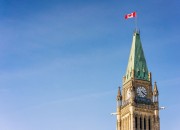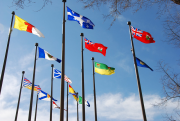At first glance, François Paulette, George Poitras and Marty Cobenais may not appear to have that much in common. Their homes are separated by a massive stretch of land — ranging from the Northwest Territories across to northern Alberta and down to Michigan. They speak different languages, and were raised with distinct customs and values.
But as aboriginal leaders, they share a common burden that has led them to Washington D.C. this week to meet with U.S. officials, whose decisions could have a profound effect on the wellbeing of their communities. The Obama administration is considering a proposal to build a massive pipeline from Alberta to Texas, to pump as much as 900,000 barrels of tar sands oil per day to the U.S. Gulf Coast. First Nations communities on both sides of the border have passed resolutions opposing the pipeline and have called on governments to hold off on future development out of respect for environmental limits and treaty rights.
 "What we wanted to bring is the big picture of how tar sands development is impacting a vast territory in the North — from climate change, to chemicals in our water, to the caribou herds that are becoming endangered," said Paulette, a member of the Smith's Landing Treaty 8 Dene First Nation and a commissioner with the Assembly of First Nations. Paulette has become a prominent figure in the debate over oil sands development in Alberta, serving as a First Nations negotiator and consultant on the impacts of oilsands operations on land and water.
"What we wanted to bring is the big picture of how tar sands development is impacting a vast territory in the North — from climate change, to chemicals in our water, to the caribou herds that are becoming endangered," said Paulette, a member of the Smith's Landing Treaty 8 Dene First Nation and a commissioner with the Assembly of First Nations. Paulette has become a prominent figure in the debate over oil sands development in Alberta, serving as a First Nations negotiator and consultant on the impacts of oilsands operations on land and water.
For the three leaders, those impacts are both very real, and very personal.
George Poitras comes from the community of Fort Chipewyan, which borders the Athabasca River directly downstream of the most intensive oilsands development. As a former chief of the Mikisew Cree First Nation, Poitras has long argued that pollution in the river may be linked to an unusual occurrence of cancer among people in his community. A 2009 report from the Alberta Cancer Board found that overall, the cancer rate in Fort Chipewyan was 30 per cent higher than expected — and scientific studies have linked many of the types of cancers reported with exposure to petroleum products.
"We've had so many funerals in Fort Chipewyan, so many wakes and so many funerals that people don't go anymore," one long-time resident of Poitras' community recently told the Edmonton Journal. "Every family in Fort Chip is affected by this. Everybody lost somebody to cancer and it's just so devastating and yet ... yet it just continues."
In Paulette's community, the main concern is how toxins in the river and low water levels may be affecting the migratory birds, fish and wildlife that depend on waterways downstream of oilsands operations.
"The river that flows by us is polluted," he says. "If you want to travel on the river, you have to bring fresh drinking water. Twenty years ago, you didn't have to do that."
 Those are the experiences the three aboriginal leaders brought into discussions this week with officials from the White House Council on Environmental Quality, the State Department, the Department of Interior and others. With proposed projects like the Enbridge Northern Gateway pipeline and Keystone XL on the horizon, the stakes were high — but Paulette says the meetings with officials have been productive and encouraging.
Those are the experiences the three aboriginal leaders brought into discussions this week with officials from the White House Council on Environmental Quality, the State Department, the Department of Interior and others. With proposed projects like the Enbridge Northern Gateway pipeline and Keystone XL on the horizon, the stakes were high — but Paulette says the meetings with officials have been productive and encouraging.
"They listened to our concerns, and asked a lot of questions," said Paulette. "We just have to keep coming back and talking to the people who can make the changes we need to see."
Marty Cobenais knows what's on the line if the leaders don't pay attention to the delegation's message. A member of the Red Lake Band of the Chippewa (Ojibwe), Cobenais grew up in a community in Northern Minnesota that's crisscrossed by pipelines. One sprung a leak years ago, but Cobenais says a large amount of the oil was never properly cleaned up and remains in the ground.
"I don't want to see that happen anywhere else," he said. "We don't need this pipeline. It's time our politicians and lawmakers recognized that we have better alternatives."





